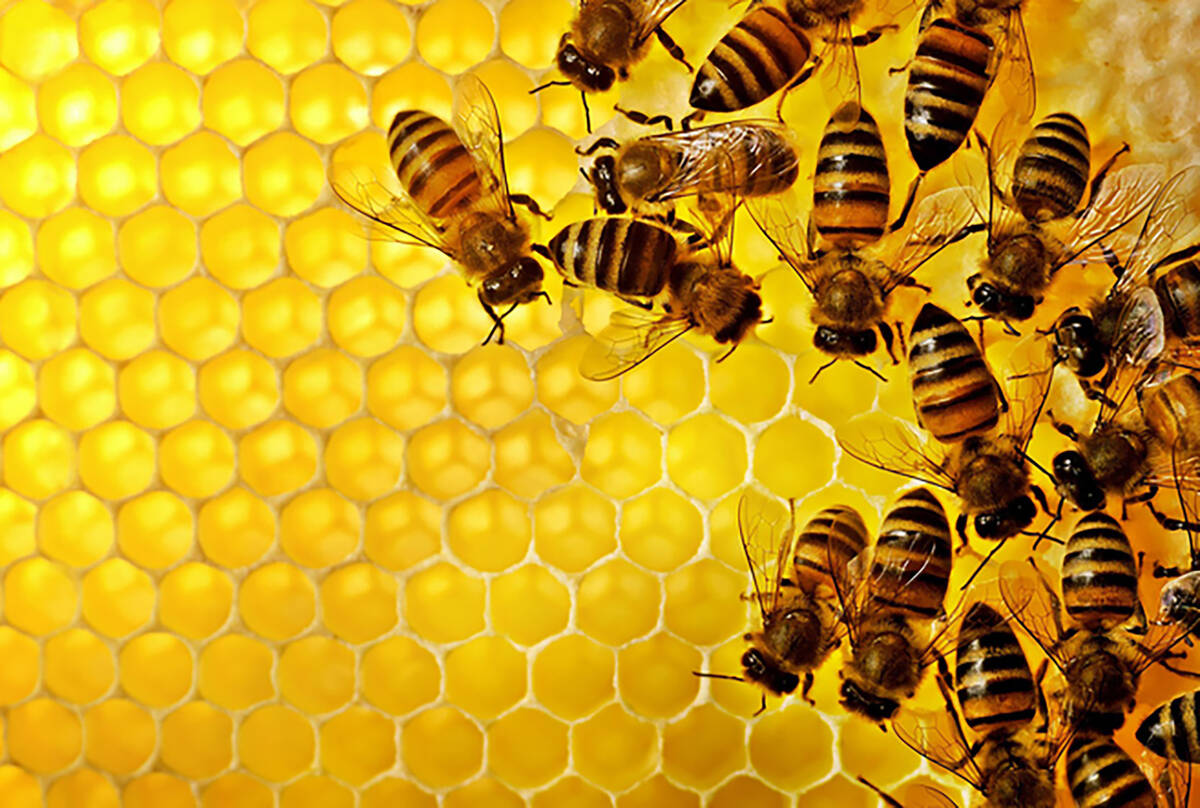Knowledge can help you overcome bee stings, attack
Do you know what attracts or excites bees? Do you know how to handle a bee sting — or perhaps several?
While usually not a major health issue, bee stings can sometimes cause a severe allergic reaction in some people, requiring immediate emergency medical treatment.
Bee stings can produce different reactions, ranging from temporary pain and discomfort to a severe allergic reaction, according to the Mayo Clinic. Having one type of reaction doesn’t mean you’ll always have the same reaction every time you’re stung or that the next reaction will necessarily be more severe.
Warmer weather and increased outdoor activity boosts the possibility of people encountering bees in Southern Nevada. Bees tend to be most active from the spring to the fall, when they are colonizing and looking to set up hives, according to the Nevada Department of Agriculture. A swarm of bees is generally not harmful unless disturbed. They are moving from place to place to colonize new hives.”
“When you are outdoors, be aware of your surroundings and keep an eye out for bees the way you would watch out for snakes and other natural dangers,” Clark County Fire Chief John Steinbeck said. “If you accidentally encounter bees, do not disturb them. Remain calm and quietly move away, keeping yourself and your family members and pets out of harm’s way to avoid stinging incidents. Bees are generally docile unless they are disturbed or threatened.”
If you concerned about removing beehives in their yards, it’s best to contact professional exterminators that use appropriate safety gear and clothing.
The Nevada Pest Management Association maintains a list of licensed removal services on its Bee Hotline at 702-385-5853 and on its website at nevadapma.org. Bees on public property should be reported to the respective government agency for control. Beehives in county parks or on county property can be reported to the Parks Department at 702-455-8200 during normal business hours.
People who are sensitive to bee stings should consult their doctors about bee sting kits and procedures for using them.
If someone is stung by a bee, becomes dizzy, nauseated or has difficulty breathing, an allergic reaction to the sting may be occurring. This is a serious medical emergency and 911 should be called immediately.
Severe allergic reaction
A severe allergic reaction (anaphylaxis) to bee stings is potentially life-threatening and requires emergency treatment, Mayo Clinic officials advise. A small percentage of people who are stung by a bee or other insect quickly develop anaphylaxis. Signs and symptoms of anaphylaxis include:
— Skin reactions, including hives and itching and flushed or pale skin.
— Difficulty breathing.
— Swelling of the throat and tongue.
— A weak, rapid pulse.
— Nausea, vomiting or diarrhea.
— Dizziness or fainting.
— Loss of consciousness.
Other tips
— Wear light-colored clothing when you are outdoors. Dark colors can attract bees.
— If bees attack, run away as fast as possible in a straight line and take shelter inside a car or building. Use your arms and hands or shirt, towel or similar item to shield your face and eyes from stings. Do not try to fight the bees by swatting at them. The more you flail your arms, the more aggressive the bees will get.
— Do not jump into water or thick brush, which do not provide adequate protection. If you jump into water, bees will attack you when you come up for air.
— After an attack, bees will continue to be agitated by loud or humming noises such as barking dogs, lawnmowers, weed eaters and flashing lights.
— If you are stung, remove the stinger by scraping it out and washing the area with soap and water and applying a cold pack to the sting site. When a bee stings, it leaves a stinger in the skin. This kills the bee so it can’t sting again but the venom remains.
— If you are stung more than 10 times, you should seek medical attention as a precaution. Reaction to bee venom takes several hours, which may cause you to feel sick later.





























